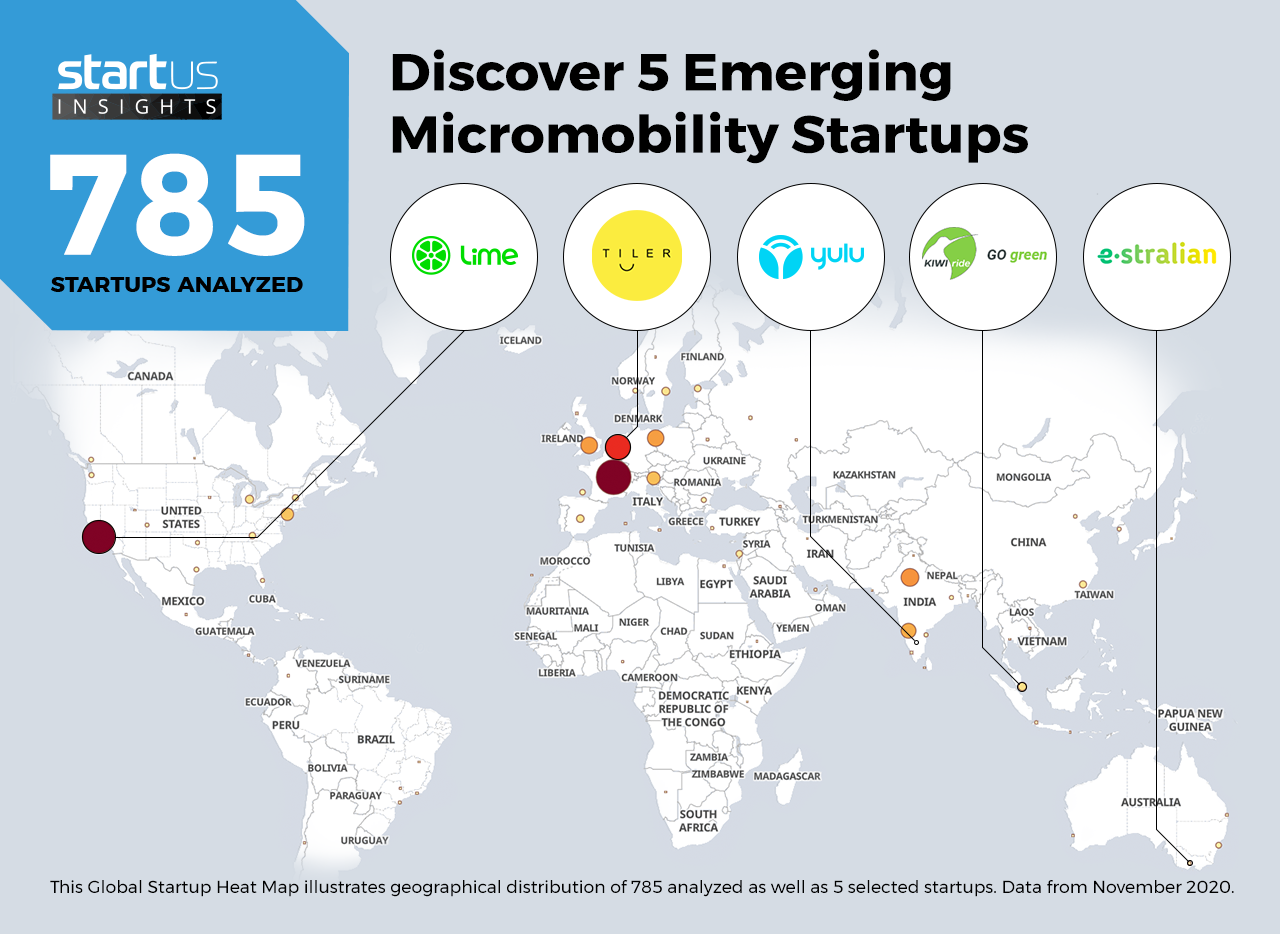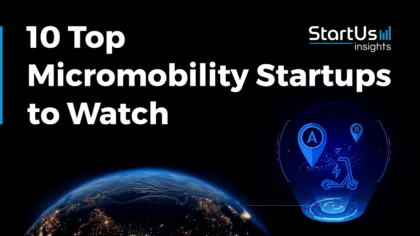Accelerate Productivity in 2025
Reignite Growth Despite the Global Slowdown
Our Innovation Analysts recently looked into emerging technologies and up-and-coming startups working on innovative solutions for the mobility sector. As there is a large number of startups working on a wide variety of solutions, we want to share our insights with you. This time, we are taking a look at 5 promising micromobility startups.
Heat Map: 5 Top Micromobility Startups
Using our StartUs Insights Discovery Platform, covering 1.379.000+ startups & scaleups globally, we looked at innovation in the field of urban mobility. For this research, we identified 785 relevant solutions and picked 5 to showcase below. These companies were chosen based on a data-driven startup scouting approach, taking into account factors such as location, founding year, and relevance of technology, among others. Depending on your specific criteria, the top picks might look entirely different.
The Global Startup Heat Map below highlights 5 startups & scaleups developing innovative micromobility solutions. Moreover, the Heat Map reveals regions that observe a high startup activity and illustrates the geographic distribution of all 785 companies we analyzed for this specific topic.
E-stralian – E-Bike Leasing
Micro-mobility is gradually gaining in popularity across the world for its convenience and environmental benefits. E-bikes are pedal-assisted electric bicycles that combine advanced electrification technology with easy-to-use vehicles to provide comfort and functionality to mobility. Startups are taking advantage of low-cost technologies to further encourage the adoption of to use of micromobility options for commuting.
E-stralian is an Australian startup that offers affordable e-bike leasing and sales solutions for commuting. These e-bikes are fully maintained, insured against theft and damage, and are also available for lease. The startup provides its riders with navigation and roadside assistance. E-stralian also provides a fleet of e-bikes for workplaces, apartments, or hotels to provide a green and healthy alternative to driving cars. The startup supports employers looking to provide an efficient and healthy commute for their employees with e-bikes. As a result, the micromobility startup provides first and last-mile commute options for traveling in the city.
Tilercharge – Wireless E-Bike Charging
Building suitable electrification infrastructure in cities plays a major role when it comes to introducing and adopting electric mobility. Designated bike lanes, parking spaces, and charging grids are a few requirements for having fully operational e-bikes in the city. However, maintaining a dedicated infrastructure for charging e-bikes poses several challenges for city planners. This encourages mobility startups to develop wireless charging solutions to integrate charging systems with existing infrastructure.
Dutch startup Tilercharge offers wireless e-bike charging systems. The startup builds smart infrastructure for cities with their tile- and stand-based charging solution. A universal charging stand is installed on the e-bike and the energy tile is connected to the electricity grid underground. Once the charging stand and tile come in contact with each other, the vehicle’s battery begins to charge. The startup also offers full installation and maintenance services for its users.
Lime – Green Micro Mobility
Electric scooters are among the most sustainable modes for the urban commute, with the potential to replace all car trips under 5 miles. Transportation alone contributes to approximately one-fourth of global carbon dioxide (CO2) emissions. Hence, one of the most significant factors for the popularity of micro-mobility is its environmental friendliness. With further advancements in electric vehicle (EV) battery technology, e-scooters show promise for tackling multiple issues facing smart cities, including traffic congestion and vehicle pollution.
Lime is a US-based startup aiming to create a new urban mobility lifestyle solution. The startup’s mobile app allows riders to easily find and unlock smart bikes and e-scooters. Lime uses renewable energy to power its e-vehicles and warehouses. The startup’s energy portfolio includes wind, solar, and hydroelectric sources. Further, Lime utilizes recycled materials to build its micromobility e-vehicles.
KIWIride – Last-Mile Travel
The ease of riding an e-bike or scooter allows users to navigate through traffic on congested roads. As growing populations in the urban cities fight for real estate, micro mobility solutions offer novel and disruptive ideas for urban mobility. Mobility startups are providing a faster and easy solution for first and last-mile travel. The e-bikes are convenient and aim to solve the problem of short-distance commuting.
KIWIride is an Indonesian startup that allows cities to plan a greener and cleaner future for urban mobility. The startup’s solution enables unlocking up to 5 scooters from a single app and reserve a scooter for up to 5 minutes. The KIWIride app uses the global positioning system (GPS) data to show the available scooters in the vicinity of the commuter. The startup also maintains all ride histories for future reference and analysis. This solution encourages riders and local residents to contribute to national environmental targets.
Yulu – Electric Two-Wheeler Sharing
Micro mobility is a powerful tool to tackle greenhouse gas emissions and increase access to cheap transportation. They are also more fuel-efficient without depending on fossil fuels. Bicycles, which are popular for short-distance commuting, also help solve first and last-mile commute challenges. But e-bikes, being lightweight and faster than bicycles, are attracting more city-dwellers to switch to a convenient form of commute.
Yulu is an Indian startup providing electric two-wheelers to reduce traffic conditions in urban India. The Yulu App uses machine learning (ML) algorithms to efficiently manage vehicle demand and supply. The solution features dockless electric vehicles powered by the internet of things (IoT) technologies. Further, the startup offers Miracle and Move, two micromobility options that are powered by GPS, general packet radio service (GPRS), and Bluetooth technologies for a safer ride, with a maximum speed of 25 kilometers per hour.
What About The Other 780 Solutions?
While we believe data is key to creating insights it can be easy to be overwhelmed by it. Our ambition is to create a comprehensive overview and provide actionable innovation intelligence and enable you to achieve your goals faster. The 5 micromobility startups showcased above are promising examples out of the 785 we analyzed for this article. To identify the most relevant solutions based on your specific criteria, get in touch.








